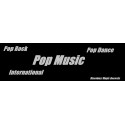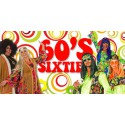No products
Vinyl, record collectors. Thousands of vinyls available in Discobuzz shop. Sort by artist or style of music. Daily arrivals from all countries. New and used vinyl records. Musical styles for sale: Rock, Pop, Jazz, Reggae, Disco, Funk, Garage, Punk, Rock, Hard Rock, Metal, Hip Hop, Groove, Soul, Atmosphere Holidays, Italo Disco, Dance Music, Hous...
Vinyl, record collectors. Thousands of vinyls available in Discobuzz shop. Sort by artist or style of music. Daily arrivals from all countries. New and used vinyl records. Musical styles for sale: Rock, Pop, Jazz, Reggae, Disco, Funk, Garage, Punk, Rock, Hard Rock, Metal, Hip Hop, Groove, Soul, Atmosphere Holidays, Italo Disco, Dance Music, House Music, Techno, Electro, Electronic Music, Soundtracks, African and Caribbean Music, Brazilian Music, Music of the Islands, Traditional Music, blessings, French Chanson, national and international varieties, Classical Music, etc ...
Vinyls There are no products in this category.
Subcategories
-
Ambiance Fêtes
-
Afrique Antilles
-
Blues
The blues is a vocal and instrumental musical genre, derived from the work songs of the Afro-American populations who appeared in Mexico and the United States during the 19th century as well as immigrants from England, Ireland, Scotland, Spain, France, Poland and France. Cherokee Indians, people of poor conditions who also expressed their sorrows in a comparable genre of music.
It's a genre where the singer expresses his sadness and his setbacks (hence the expression “having the blues”). The blues has had a major influence on American popular music, since it is the source of jazz, R'n'B and rock 'n' roll among others. -
Compilation
In music, a compilation, a “compilation” in colloquial language, is an album or an audiovisual work grouping together several recordings, sometimes mixed, with common characteristics.
-
Country Music
-
Disco Music
-
Electro
-
Electronic Space Music
Spatial music can vary in character, the sound texture of music can be simple or complex, it can be instrumental or electronic.
Music with stellar sounds for a galactic and spatial atmosphere
-
Eurodance
-
Eurovision
The Eurovision Song Contest, more commonly known as Eurovision, (in English: Eurovision Song Contest or ESC) is an annual event organized by the European Broadcasting Union (EBU). It brings together the members of the Union within the framework of a musical competition, broadcast live and simultaneously by all the participating broadcasters. It is broadcast on television (cable and satellite), radio and on the Internet.
Its very first edition took place on May 24, 1956, in Lugano, Switzerland. -
Experimental
-
Brass & Military
Brass & Military is usually music associated with marching bands, marches, or music with military and war themes.
A fanfare is a group of musicians whose instruments are exclusively brass instruments accompanied occasionally by percussion.
Whether it is a wind band, brass band, big band, jazz band, drums-brass band, clique, guggenmusik or other brass band, all are most often referred to under the generic term "fanfare". Some national armies have many formations such as Switzerland with its three recruit school brass bands, its eight harmony orchestras, its eight brass bands and its five army orchestras -
Folk Music
-
Funk Music
The origins of funk date back to the 1950s in New Orleans where the idea for these rhythms came from the bars of New Orleans which were poor and only had a piano to entertain the customers. The piano was the ideal instrument for musicians to synthesize both bass, drums, guitar, vocals or brass instruments on a single instrument.
Funk then hit the streets of New Orleans, performed by the Brass Band long before James Brown and saxophonist Maceo Parker popularized its style. In the 1970s, the commercial development of funk accompanied, from the end of the 1960s, that of African-American culture, like James Brown, who in 1973 produced the soundtrack for the blaxploitation film Black Caesar.
The funk movement remained initially ignored by the white public, which it finally managed to reach, especially thanks to disco, in the second half of the 1970s. The general public was finally converted, in particular by the groups The Commodores with Lionel Ritchie and Chic, by Nile Rodgers (guitar) and Bernard Edwards (bass), who had a string of successes from 1977 (Chic Cheer, le Freak, Good Times, to name only the best known).
Groups founded at the end of the 1960s, such as Kool & The Gang, or Earth, Wind and Fire, hitherto known to fans, then enjoyed considerable public success. Funk music will be turned upside down at the beginning of the 80s by the massive arrival of new electronic instruments, in particular synthesizers and rhythm boxes.
Among the many personalities representative of this more electronic wave of funk are producers like Prince Rogers Nelson, Jimmy Jam and Terry Lewis, Kashif, Leon Sylvers III, Paul Laurence, Lester and Rodney Brown, William Anderson and Raymond Reid, David Frank , Marcus Miller... bands like D. Train, Change, Cameo, Zapp & Roger, B. B. & Q. Band, The SOS Band, Mtume, Starpoint, One Way, Loose Ends, The Whispers, Midnight Star, The System. .. artists like Howard Johnson, Melba Moore, Evelyn King, Sharon Redd, Alexander O'Neal, etc... -
Garage Punk
Garage rock, garage rock, or garage music is a genre of rock emerged in the mid-1960s, characterized by the simplicity of the compositions and often artisanal production. Punk rock is a derivative genre of rock emerged in the mid 1970s and associated with the punk movement of that same era. Preceded by a variety of protopunk music of the 1960s and early 1970s, punk rock developed primarily between 1974 and 1976 in the United States, the United Kingdom and Australia. Bands like the Ramones, the Sex Pistols, and The Clash were recognized as the pioneers of a new musical movement. The garage punk is a subgenre of punk rock that mixes garage rock with which it is closely related, and punk.
-
Hard Rock - Metal - Heavy
Hard rock is a genre of rock that appeared in the mid-1960s mainly in the United States and the United Kingdom. In general, hard rock is defined by a mixture of aggressive sounds due to guitars subjected to strong distortions and blues elements, in particular the use of pentatonic scales, all accompanied sometimes by pianos and keyboards.
Rooted in blues rock, psychedelic rock and garage rock, it became one of the most popular genres of rock in the 1970s and 1980s with bands like AC/DC, Aerosmith, Deep Purple, Guns N' Roses, Led Zeppelin, Scorpions, Kiss and Van Halen.
Hard rock reached a commercial peak in the late 1980s. Glam metal, with bands like Bon Jovi and Def Leppard and the rawer sounds of Guns N'Roses and Mötley Crüe, successfully followed in the latter part of that decade, before losing popularity to the commercial success of grunge and later Britpop in the 1990s.
Despite this, many post-grunge bands embraced a hard rock sound, and in the 2000s there was a resurgence of interest within established bands. New hard rock bands emerged from garage rock and post-punk revival. -
House Music - Techno
-
Italo Disco
-
Jazz
-
Jazz Rock Fusion
Jazz rock or jazz fusion is a musical style launched in the late 1960s, mixing elements extracted from jazz with other musical styles such as rock, blues, funk and others ...
-
Krautrock
The krautrock ironically designating the German progressive, experimental and psychedelic rock of the late 1960s, is mainly represented by groups originating in West Germany.
-
Classical Music
Classical music (sometimes also called "great music"), popular music is sometimes thin. First of all, Renaissance music (so-called classical music) derives its roots from both Gregorian chant and the secular music of troubadours and Medieval finds. Conversely, 20th century variety music is largely based on the tonal system, gradually introduced from baroque music at the dawn of the seventeenth century, and the temperate scale (late eighteenth century). The connections between the two great families of European music are therefore numerous, which makes the term classical music even more vague.
-
Soundtracks
Film music is the music used for a film intended by the director and / or producer. It may be pre-existing music (compilations, times, as in 2001, A Space Odyssey, Trainspotting or Pulp Fiction) and music composed especially for the film: this is called "soundtrack "(BO), English" original soundtrack "(OST). Film music has made its first appearance Nov. 17, 1908, the day of release of the film The Assassination of the Duke of Guise, André Calmettes and Charles Le Bargy. The music of this film was composed by Camille Saint-Saëns, who became the first renowned composer to compose music specifically for a movie. Generally separated into several types: Classic BO: original music written for the film by composer "classic" instrumental, orchestral and / or choral (Vertigo, The Good, the Bad and the Ugly, Star Wars, Blade Runner, Titanic, The Lord of the Rings) BO by popular artist: original music written for the film by a popular artist (More, Delusions of Grandeur, Superfly, Virgin Suicides, There Will Be Blood, Tron: Legacy) Compilation times of existing songs, classical or popular (2001, A Space Odyssey, Pulp Fiction, Trainspotting, Almost Famous, Kill Bill, Inglourious Basterds) Recording "live" performed and recorded during filming, sometimes even about shooting music. -
Musique du Monde
-
Musique Latine
-
Music for Children
Children's music is first known in the form of traditional nursery rhymes, created since the 18th century and sometimes even before (Sur le pont d'Avignon, Ne pleure pas, Jeannette, Frère Jacques), several of which have been transmitted and disseminated .
-
New Wave
-
Oriental Music
Oriental music has an oral tradition, that is, there are no scores or written traces of the compositions. This promotes variation and improvisation. Thus the repertoire of oriental compositions is very limited in comparison to western music.
-
Pop Music
-
Rap Français
French rap emerged in the early 1980s, French rap remained very marginal. The program broadcast on TF1 during the year 1984 only allowed for short-term media exposure and there were still few culture enthusiasts.
The events of the vacant lot of Quartier de la Chapelle organized will offer the possibility to Parisian groups like Suprême NTM and Assassin to emerge. From the end of the 1980s, French rap will have more and more media exposure.
Today, the French scene is represented by artists such as Iam (Akhenaton, Shurik'n, Freeman and dj Khéops) Fonky Family (Don Choa, Rat Luciano, Sat l'Artificier...), Lunatic, (Booba, Ali) 113, Mafia K'1 fry, Sniper, Oxmo Puccino, Sultan, Kery James, Keny Arkana, ATK, Psy 4 de la rime, Booba, La Fouine, 1995, or Orelsan. -
Rap US - Hip Hop
-
French RnB
Contemporary R&B (commonly referred to as simply R&B) is a music genre that combines rhythm and blues with elements of pop, soul, funk, hip hop and electronic music.
-
Reggae Music
-
Rock Français
-
Rock Music
-
Psychedelic Rock
-
Rock Progressif
-
Sixties
-
Soul Music
-
Stars TV - Stars Cinéma
-
Tangos - Pasos - Rétro
Tango is a musical genre and ballroom dance from Argentina and Uruguay.
The Paso Doble genre of vocal and instrumental music, a purely instrumental genre of music played during bullfights as well as at a ballroom dance and a sports dance. -
Trip Hop Music
-
Variété Française
-
World Music












































